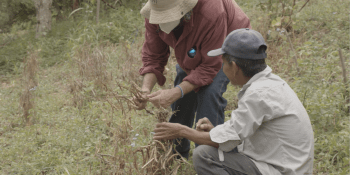Scaling out climate-smart agriculture: what can we learn from each other?

A recently held workshop brought together scientists and policy makers from developing countries to discuss ways to scale out climate smart agriculture practices through policies and institutions. This resulted in a fruitful South-South learning workshop.
Good policies can be game-changers in climate risk management, said Jeremy Bird, Director General of the International Water Management Institute. He cited a successful example in Gujarat state of India, which regulated free electricity supply and restored years of groundwater imbalance.
Jeremy Bird was speaking at a workshop on Institutions and Policies to Scale out Climate Smart Agriculture, held in Colombo, Sri Lanka in the first week of December.
The workshop was coordinated by the CGIAR Research Program on Climate Change, Agriculture and Food Security (CCAFS) South Asia, and brought together scientists, policymakers and private sector representatives from diverse regions.
Learn more: Scaling-up climate smart practices – why is it so hard?
In an opening remark, Pramod Aggarwal, Regional Program Leader for CCAFS South Asia, explained to participants that:
“The objective of this workshop is to facilitate South-South learning and exchange of experiences, challenges and opportunities in scaling out climate smart agriculture, particularly with regard to policy and institutions.”
Linking farm technologies with policies
While the adoption of climate-smart agriculture practices is critical at the farm level, parallel efforts to strengthen institutions and policies in developing countries are urgently needed to scale out climate-smart agriculture. CCAFS recently launched a publication entitled Climate-smart agriculture: success stories from farming communities around the world which highlights the importance of policies and institutions among other success factors.
There is also a toolkit being prepared, to guide policy makers on which climate-smart practices work best in their regions or countries. The toolkit is being developed for different regions.
Read more: New toolkit on climate-smart agriculture can help policymakers make better decisions
Farmers in Bihar, India observe how a leaf-colour chart can be used to decide how much fertilizers to use. One of many climate-smart agriculture practices being promoted in our South asia climate-smart villages. Photo: V.Reddy
Learning from each other
The workshop was split into different themes on topics such as insurance for climate risk management, south-south learning through case studies, and decision-making challenges in prioritising climate-smart agriculture interventions.
How is index-based livestock insurance in East Africa helping farmers manage climate risks? What has been Brazil’s experience in implementing a national plan to lower carbon emissions in agriculture; and what is the impact of government policies on climate change adaptation and mitigation in South Asia? These were some of the presentations around which discussions revolved.
The presentations were interspersed with group discussions around three topics: what business strategies can support adoption of climate-smart agriculture; what are the institutional policies that will help scale out climate change; and what public policies are needed for the adoption of climate-smart agriculture.
The last two days were dedicated to group trainings on CCAFS decision-making support tools with researchers and policymakers going into detail on methodologies and application. Participants were able to test some of the tools with help from dedicated trainers.
What were the key messages from the workshop?
The key message emerging from the workshop were: policies and institutions are the bedrock on which the success of climate smart agriculture rests.
In terms of South-South learning, there were several examples of public-private-partnership models, for instance, in the agriculture insurance sector in India and Kenya that could be replicated in other countries. There were also lessons to be drawn from existing National Adptation Policies and on how data and prioritisation toolkits must be localised for best results.
Summing up the workshop, Rose Nganga from the Syngenta Foundation for Sustainable Agriculture, had an excellent remark:
“The workshop was a great opportunity to witness the diversity of challenges and solutions in scaling out climate-smart interventions and in mitigating climate risks to farmers. I am left with more questions than answers but this is a good sign that there are many opportunities to explore further.”
Learn more about the role of institutions and policies linked to scaling-up climate-smart agriculture: Well-functioning 'rules of the game' crucial for agricultural development
Learn more about the workshop:
- View all the presentations on our Slideshare account
- View pictures from the workshop on the CGIARCLIMATE Flickr page
Dharini Parthasarathy is a Communications Speciallist with CCAFS South Asia. Sign up to the South Asia newsletter and follow @Cgiarclimate_SA for the latest updates on climate change and agriculture from the region.




